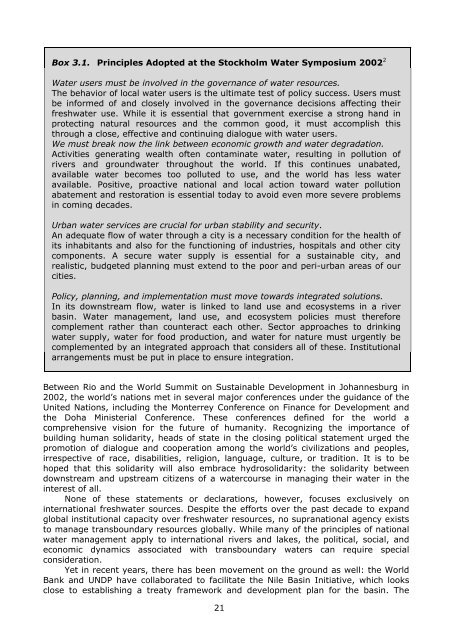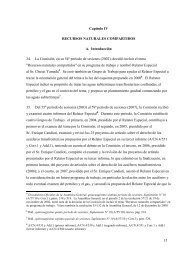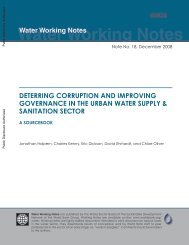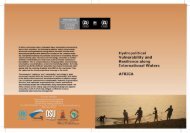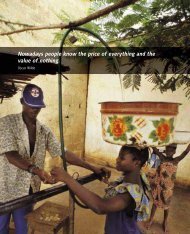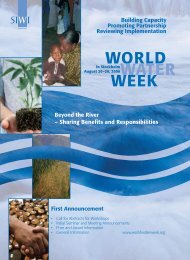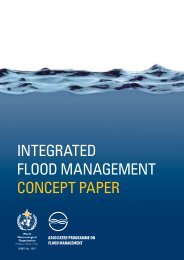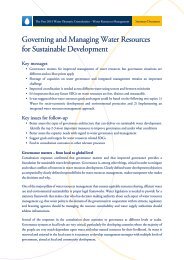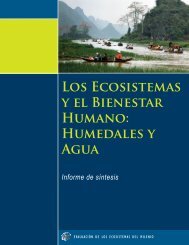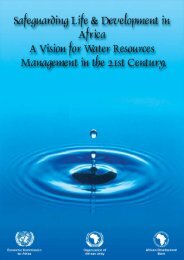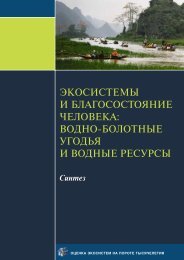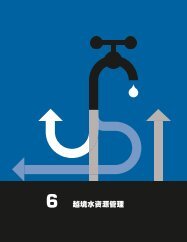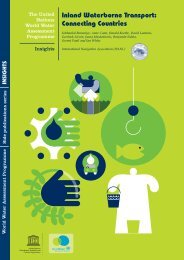Water security and peace: a synthesis of studies ... - unesdoc - Unesco
Water security and peace: a synthesis of studies ... - unesdoc - Unesco
Water security and peace: a synthesis of studies ... - unesdoc - Unesco
Create successful ePaper yourself
Turn your PDF publications into a flip-book with our unique Google optimized e-Paper software.
Box 3.1. Principles Adopted at the Stockholm <strong>Water</strong> Symposium 2002 2<br />
<strong>Water</strong> users must be involved in the governance <strong>of</strong> water resources.<br />
The behavior <strong>of</strong> local water users is the ultimate test <strong>of</strong> policy success. Users must<br />
be informed <strong>of</strong> <strong>and</strong> closely involved in the governance decisions affecting their<br />
freshwater use. While it is essential that government exercise a strong h<strong>and</strong> in<br />
protecting natural resources <strong>and</strong> the common good, it must accomplish this<br />
through a close, effective <strong>and</strong> continuing dialogue with water users.<br />
We must break now the link between economic growth <strong>and</strong> water degradation.<br />
Activities generating wealth <strong>of</strong>ten contaminate water, resulting in pollution <strong>of</strong><br />
rivers <strong>and</strong> groundwater throughout the world. If this continues unabated,<br />
available water becomes too polluted to use, <strong>and</strong> the world has less water<br />
available. Positive, proactive national <strong>and</strong> local action toward water pollution<br />
abatement <strong>and</strong> restoration is essential today to avoid even more severe problems<br />
in coming decades.<br />
Urban water services are crucial for urban stability <strong>and</strong> <strong>security</strong>.<br />
An adequate flow <strong>of</strong> water through a city is a necessary condition for the health <strong>of</strong><br />
its inhabitants <strong>and</strong> also for the functioning <strong>of</strong> industries, hospitals <strong>and</strong> other city<br />
components. A secure water supply is essential for a sustainable city, <strong>and</strong><br />
realistic, budgeted planning must extend to the poor <strong>and</strong> peri-urban areas <strong>of</strong> our<br />
cities.<br />
Policy, planning, <strong>and</strong> implementation must move towards integrated solutions.<br />
In its downstream flow, water is linked to l<strong>and</strong> use <strong>and</strong> ecosystems in a river<br />
basin. <strong>Water</strong> management, l<strong>and</strong> use, <strong>and</strong> ecosystem policies must therefore<br />
complement rather than counteract each other. Sector approaches to drinking<br />
water supply, water for food production, <strong>and</strong> water for nature must urgently be<br />
complemented by an integrated approach that considers all <strong>of</strong> these. Institutional<br />
arrangements must be put in place to ensure integration.<br />
Between Rio <strong>and</strong> the World Summit on Sustainable Development in Johannesburg in<br />
2002, the world’s nations met in several major conferences under the guidance <strong>of</strong> the<br />
United Nations, including the Monterrey Conference on Finance for Development <strong>and</strong><br />
the Doha Ministerial Conference. These conferences defined for the world a<br />
comprehensive vision for the future <strong>of</strong> humanity. Recognizing the importance <strong>of</strong><br />
building human solidarity, heads <strong>of</strong> state in the closing political statement urged the<br />
promotion <strong>of</strong> dialogue <strong>and</strong> cooperation among the world’s civilizations <strong>and</strong> peoples,<br />
irrespective <strong>of</strong> race, disabilities, religion, language, culture, or tradition. It is to be<br />
hoped that this solidarity will also embrace hydrosolidarity: the solidarity between<br />
downstream <strong>and</strong> upstream citizens <strong>of</strong> a watercourse in managing their water in the<br />
interest <strong>of</strong> all.<br />
None <strong>of</strong> these statements or declarations, however, focuses exclusively on<br />
international freshwater sources. Despite the efforts over the past decade to exp<strong>and</strong><br />
global institutional capacity over freshwater resources, no supranational agency exists<br />
to manage transboundary resources globally. While many <strong>of</strong> the principles <strong>of</strong> national<br />
water management apply to international rivers <strong>and</strong> lakes, the political, social, <strong>and</strong><br />
economic dynamics associated with transboundary waters can require special<br />
consideration.<br />
Yet in recent years, there has been movement on the ground as well: the World<br />
Bank <strong>and</strong> UNDP have collaborated to facilitate the Nile Basin Initiative, which looks<br />
close to establishing a treaty framework <strong>and</strong> development plan for the basin. The<br />
21


